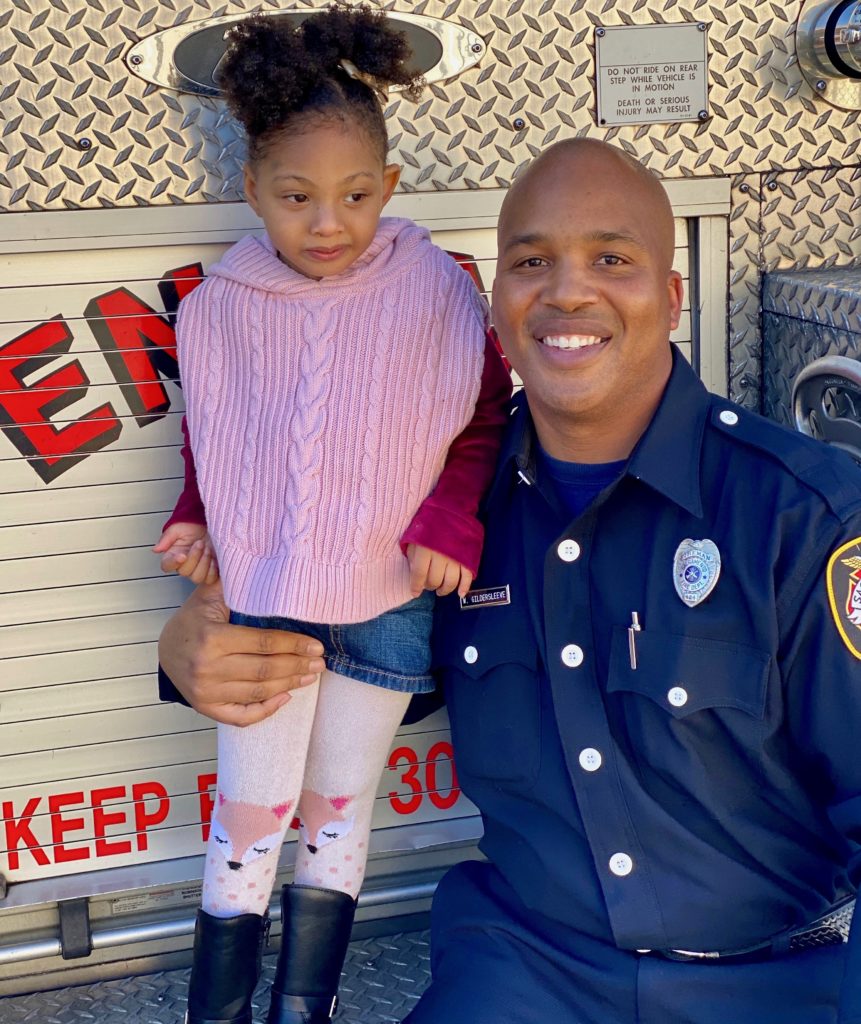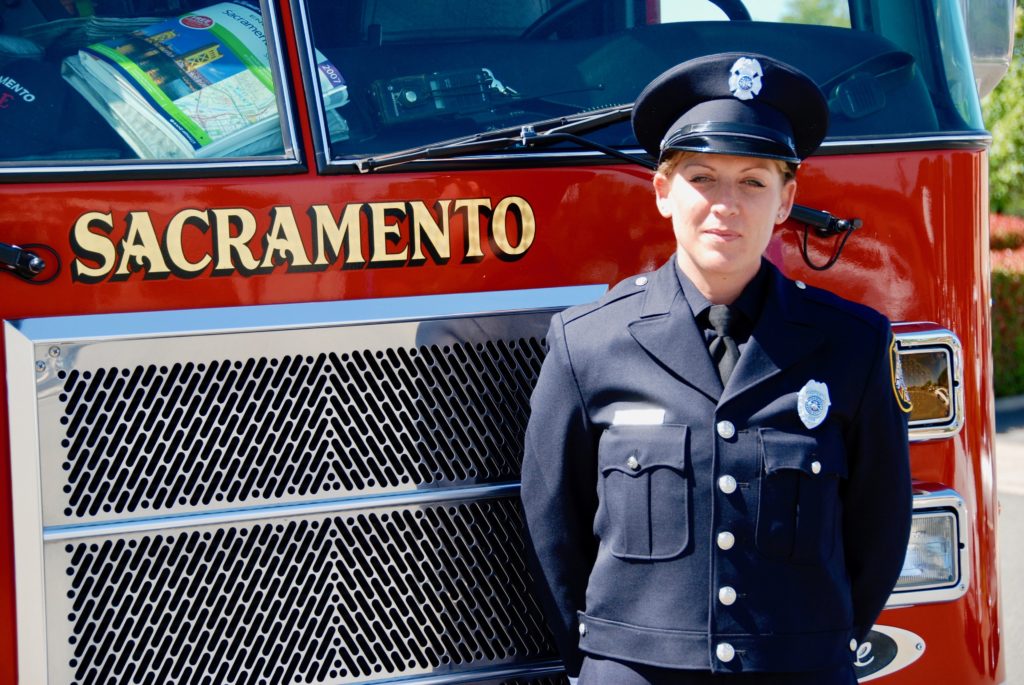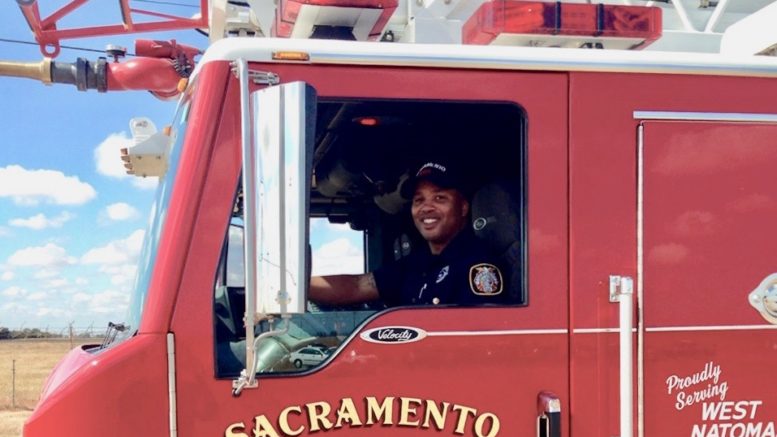Two department veterans recount startling unprofessionalism, Chief vows to chart a new course
When Sacramento city firefighter Waris Gildersleeve heard that his colleague Desmond Lewis was resigning, he knew it would have an impact. That’s because Gildersleeve and Lewis were part of the 2.4% of the department that is African American, a perplexing distinction within a force that’s more than 580 firefighters strong. When representation is that off-kilter in one of the most diverse cities in the nation, even a single resignation has ripple effects.
Now, Gildersleeve has also resigned from being a firefighter, though he’s still employed as a fire inspector. A 15-year veteran of the department, Gildersleeve says the reason he no longer wanted to be working in station houses involves the same worries Lewis had when he put in his papers: Some Captain-level supervisors don’t address bullying, harassment, racist remarks or extreme unprofessionalism. And in certain cases, according to Gildersleeve, Lewis and others, they’re personally involved in the behavior.
During a month-long investigation, SN&R spoke with numerous current and former members of the department who backed up that perspective, though all – including Lewis and Gildersleeve – were emphatic that such problems don’t reflect the vast majority of men and women serving in a Sacramento Fire uniform. Gildersleeve was particularly concerned that the Sacramento firefighters’ union, Local 522, seemed to imply the opposite when it responded to Lewis going public.
“We disagree that there is a culture of bullying, racist comments or a toxic environment to work in the Sacramento Fire Department,” union president Chris Andrews wrote in a post on the organization’s Facebook page.
Lewis never said that to SN&R. What Lewis said was that, when harassment or racist incidents occur, the instinct of some supervisors is to let bad actors run free. The union’s denial of this alleged problem has now spurred Gildersleeve to open up about his own reasons for resigning. He, along with Shannon Panameno – a firefighter-paramedic who spent 17 years with the department before leaving in 2017 – stress that the ongoing issues have real and direct consequences for the public.
This week, Sacramento Fire Chief Gary Loesch acknowledged the need for change in an interview. He also laid out the details of how he plans to attack the problems that were recently brought to light.
Gildersleeve says he’s trying to stay optimistic.
“He needs people to come forward, but the problem is a lot of people don’t feel comfortable enough to come forward,” Gildersleeve said of the chief. “I’ve told him that the captains are going to say one thing to save face, but the firefighters – the ones who have no pony in the show – are going to say another thing. There are captains who aren’t going to want it known they’re letting their people get treated like shit.”

Of pettiness and power trips
Gildersleeve started with Sacramento Fire in 2006, having transferred from another department. He was an experienced firefighter who was soon promoted to inspector under Sacramento’s fire marshal. He held that position for the better part of a decade before deciding in 2017 he wanted to return to firefighting. Chief Loesch says that having firefighters like Lewis and Gildersleeve working around the public on emergency calls is one of the best recruitment tools for diversifying the department. Gildersleeve wanted to go back to saving lives and property, but also show young people from minority communities that firefighting was a viable career option.
In Sacramento, firefighters and fire inspectors generally work in different offices. They don’t often cross paths. When Gildersleeve got assigned to a station house again, the department’s human resources office warned him not to say much about his level of seniority. It was something Gildersleeve was extremely careful about. In retrospect, that might have been a mistake.
“When I transferred from fire prevention into fire suppression, most of the younger guys didn’t know me,” Gildersleeve recalled. “The older guys knew me, but a lot of them had retired out … I later learned that the rumor mill was going crazy, and that there was this rumor out there that I was a mole who’d been planted by the chief.”
Whatever the perception, Gildersleeve says that in November 2020 several members of his crew started behaving strangely around him. On Nov. 8, they confronted him with a “surprise quiz” about the station’s ambulance. Gildersleeve wasn’t assigned to the ambulance and asked if he could review it first, since the equipment in some vehicles is set up differently. Three of his crew members started denying there are differences between any ambulances in the Sacramento Fire Department.
“I knew that wasn’t true, because one station has two different ambulances that are two different makes, a Ford and a Dodge, and they’re absolutely different,” Gildersleeve remembered.
Next, the crew members started asking him where inside the ambulance “the papoose” was. Papoose is not a medical term. Gildersleeve wasn’t sure what they meant. He would later find out that it’s a Native American word from the Algonquian tribe, one referring to an infant-carrying device. His crew members were using it as slang for a pediatric backboard. But in the moment, Gildersleeve says, his confusion about what they were talking about lead to the trio demanding that he follow them into a small locker room. There, he says, they started loudly berating him – a dressing-down with a tirade that was laced in profanities.
“They were cussing at me: one of them told me that I didn’t know what an asshole I looked like,” Gildersleeve said. “They’d been using this term ‘papoose’ to try to stump me and then act like I’m an idiot. It was the kind of harassment and belittling that ran rampant in the station.”
The commotion got so loud that a captain took notice. As Gildersleeve was walking away, the captain asked what happened. He says when he started talking about how unprofessional the others were acting, the captain just shrugged him off.
“That really upset me, because at no time in my career with the fire department had I ever cussed at someone, or belittled them, or treated them in a way that would make them feel like they didn’t have a place here,” Gildersleeve said.
The very next day, Gildersleeve and another firefighter were running some drills with a charged hose and there was confusion with a captain about when it needed to be hung up to dry. Gildersleeve says that, though this miscommunication involved himself and another crew member, only he was called into the captain’s office and written up. And it wasn’t just a write-up. He says the captain was yelling at him, similar to the way the others had the day before.
“There was a lot of cursing directed at me,” he recounted. “It was far more aggressive than it needed to be. The language was just terrible.”
At one point, the captain noticed that Gildersleeve was wearing a uniform jacket that still had his fire inspector’s patch on it, rather than a firefighter’s patch. He says the captain got hostile and ordered him to take the jacket off.
“There’s this rift between fire prevention and fire suppression; but we’re all in the same department,” Gildersleeve explained with a note of disbelief. “None of this was a calm conversation; and I did take it as a form of harassment – basically just bullying from a position of power.”
Given what had happened in the last 48 hours, Gildersleeve went outside to call his wife. He was stressed out and emotional. Another firefighter walked over to check on him. Though the coworker appeared supportive, he was soon telling other firefighters in the department that Gildersleeve was acting “like a bitch.” Gildersleeve had also witnessed crew members make racist comments about another firefighter behind the person’s back. He was done. He resigned from firefighting and rejoined the fire marshal’s team nine weeks later.

When it affects the public
Both Lewis and Gildersleeve noticed how hard it was to concentrate on an important job while stuck in a toxic atmosphere, but Shannon Panameno says she’s witnessed even higher stakes for department’s problems. She also says harassment being tolerated by Sacramento Fire is a trend that goes back at least two decades.
Panameno was hired in 2000 as part of a grant the department had to increase diversity. She was brought on, along with two new Latinos firefighters, one African American recruit and one Asian recruit. The next year, the city discontinued this program – one of many stop-and-start failures to get the department more reflective of Sacramento.
Panameno says that her first year was a nightmare because she was constantly sexually pestered by a captain. As a young firefighter still on probation, she dealt with this supervisor suggesting that they have sex in a janitor closet, making comments about whether she should appear in a swimsuit calendar, and often trying to message her shoulders while she was cooking inside the station house. She says the behavior culminated in the captain leaving photos of himself in her work bed and then a dildo under her pillow and in one her fire boots.
“I was on probation, so I had no voice, no say, and I was just trying to make it through,” Panameno recalled. “My crew thought it was just fun and games … And that’s what we’re told in the academy, that if they haze you, and pick on you, it means they like you and that you’re accepted. And if they don’t, you’re out. But when you’re working as a firefighter, and you’re working as part of a team in a life and death situation, you’re completely vulnerable and dependent on your team.”
Eventually, a senior firefighter who was disturbed by what Panameno was enduring advised her to go to Local 522 for help. Panameno says that when she spoke to the union, its reps told her that their job is to advocate for firefighters accused of misconduct, not those making the accusations.
Local 522 declined to be interviewed for this story.
Later, Panameno added, the union did put her in touch with its law firm, but she worried that any hint that she was talking to attorneys would ruin her career. She says the whole chain of command new about the captain’s harassment and but did nothing.
“I took it for a while, but it really started to wear on me, to the point where I was crying when I got off shift,” she recalled. “I didn’t want to go to work, I started having palpitations, my anxiety level was through the roof.”
That captain was eventually fired for sexual misconduct with a different female employee, sources in the department said.
For a time, Panameno settled into what felt like a rewarding career with the department. She spent years working on a specific shift, surround by male counterparts she felt valued her skills and work ethic. Then, in 2010, there were changes at the station and everything was different. Panameno says two firefighters she worked with subjected her to double-standards and frequent doses of sexism and chauvinism. She recalled that one was an engineer who thought women had no place in the fire service, and the other was a captain who’d recently gotten in trouble on the job. Yet, there he was – her supervisor.
“It was bad behavior swept under the rug,” she said. “If they had dealt with that properly, then I wouldn’t have had to work with him.”
According to Panameno, keeping that captain around – and letting unprofessional attitudes slide – did not just affect her.
In 2013, firefighters were called to a home in South Sacramento where a young man had hung himself in a garage. He was dead. His mother was home, hysterical with shock and grief. Panameno was trying to comfort the woman – attempting to get her calm. The mother kept begging firefighters to cut her son down so he wouldn’t be dangling there. Panameno says the captain, who had taken to constantly undermining her own judgment, refused when the paramedic asked. A back and forth started between Panameno and the captain, with the supervisor insisting that they do nothing until the coroner arrived. All the while, the anguished mother was having a breakdown.
“He was just very smug,” Panameno said. “It would have taken us five seconds to cut him down and just lay him on the garage floor with a sheet over him. I had never experienced anything like that before. In other similar calls, the first thing we would do was cut the person down immediately. I felt like it was directed at me.”
Later that summer, Panameno and other emergency personnel responded to a car fire in a park near Meadowview. Arriving, they saw a man hanging from a tree. He was cut down and Panameno checked his vitals. She says that, though the man was pulseless, the cardiac monitor showed that he still had cardiac electrical activity. He was also still warm to the touch.
Panameno was the lead paramedic on the call. She says she asked the captain to follow protocol and help her perform CPR, hoping they would get a viable heart rhythm and manage to bring him back. The captain, according to Panameno, simply ignored her medical evaluation, refused to help and allowed the man to expire.
“We only get things done as a team; so, to be on your own – well, you can see what happened to me,” Panameno said. “It’s, ‘Will you help me do CPR?’ – No, you’re on your own. ‘Will you help me get this patient packaged up and ready for transport to the hospital?’ – No, you’re on your own. Good luck.”
She added, “So, basically, if you don’t go along with the way things are, you’re punished, and that trickles down into patient care.”
Panameno exited Sacramento Fire on medical leave in 2017.

The Chief speaks
The problems that Panameno encountered happened before Loesch was tapped to be Chief in 2018, but the issues that Lewis and Gildersleeve ran up against were under his watch. Loesch says he’s not ducking that reality. The chief has launched investigations into a number incidents, as well as held lengthy discussions with Lewis, Gildersleeve and others. He’s also sent out a department-wide message reflecting on the future.
“Our department sets clear expectations that workplace discrimination and harassment will not be tolerated,” he said. “I’ve made that clear up and down in my chain of command.”
But the evidence suggests that it has been tolerated. And for a long time. Loesch acknowledged that the department’s traditional paramilitary command structure has vulnerabilities if those ignoring harassment – or engaging in it – are supervisors. For that reason, he’s creating a new position, an Employees Relations Officer, who firefighters can approach outside the chain of command.
“I want to make it easy for every employee to bring issues up,” Loesch said. “With this [new system], employees will be able to come in, in a very secluded area where people won’t see them, and they can talk about any issues they’re having with this ERO officer, with no fear of discipline coming back at them …We do expect our firefighters to go through their captains and then through their battalion chiefs, but I understand that that can be a hurtle, so I’m trying to give them a new avenue.”
He added, “This position should build the trust.”
Loesch says he’s also stepping up efforts to diversify the department, a direct mandate it has actually been under from City Hall since 2016. He’s re-instated a working group to come up with strategies to recruit qualified women and minority candidates, and that effort – similar to a tactic used by the more diverse Oakland Fire Department – will focus almost entirely on finding young people from neighborhoods the department serves. Loesch is also adding more Emergency Medical Technicians, a position that’s far less expensive for recruits to pursue than that of paramedic.
“It takes a lot of time to get a paramedic license, and for people from underserved communities, it can be a challenge to get,” Loeasch explained. “EMT is a lower certification, but it’s a certification that decreases a lot of barriers. It gives them access into the department, and then from there, if they chose to become a paramedic, we have a process with some of the colleges here where we actually grow our own paramedics … I think the City Council wants see a comprehensive plan, which I’m prepared to give them, and I think if they see that they’ll support it whole heartedly.”






Be the first to comment on "Sacramento Fire grapples with work culture after second Black firefighter resigns"